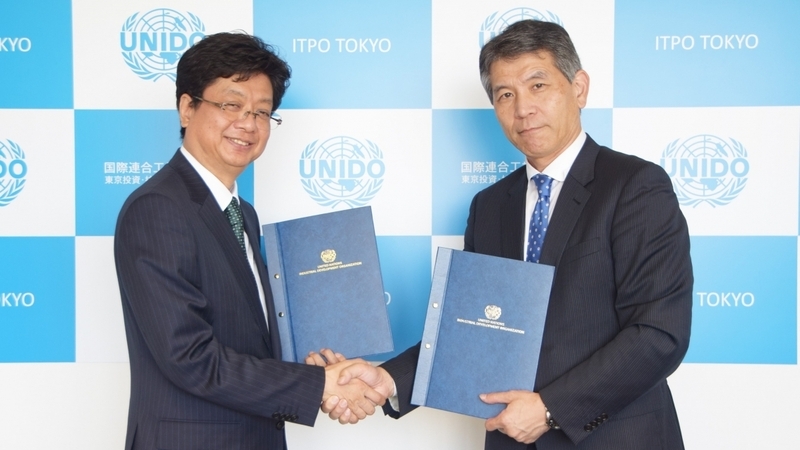
Vodafone Foundation donates €30,000 to support Mozambique over Cyclone Chido
Vodafone Foundation has pledged €30,000 to Save the Children in response to the devastation caused ...

The United Nations Industrial Development Organization (UNIDO) and Mitsui & Co. Ltd. ( also referred to as “Mitsui”) have agreed on a collaboration and partnership framework to work to promote awareness of more environmentally sustainable alternatives to single-use plastic products in Africa. The aim is to minimize leakage of plastic waste into the environment with an inclusive and sustainable industrial development initiative as a follow-up to the TICAD7 Yokohama Declaration 2019.
UNIDO Deputy to the Director General, Hiroshi Kuniyoshi, and Mitsui’s Chief Operating Officer (COO) for Performance Materials Business Unit, Takeo Kato, have signed a Memorandum of Understanding (MOU) that will enhance and strengthen cooperation to leverage each other’s expertise.
UNIDO and Mitsui will jointly conduct studies on the plastic value chain in several African countries, and jointly advocate and develop awareness of the issue of plastic leakage into the environment and advocate for less use of plastics and/or more use of environmentally sustainable alternative materials instead of single-use plastic products.
“With increased attention to the impact of marine plastic litter, a shift to alternatives to single-use plastics is unavoidable. Industry needs to adapt to the change, which could lead to the development of new green business models. With UNIDO’s mandate of inclusive and sustainable industrial development (ISID), we are happy to work with industries, particularly industries that are part of the plastic value chain, to develop sustainable production. I believe this MOU will contribute to working a step closer with the industries,” said UNIDO Deputy to the Director General Kuniyoshi.
“Mitsui has been working on the initiative to tackle the challenge of marine plastic litter from the business sector perspective. We are pleased to collaborate with UNIDO to conduct joint activities and contribute to achieving more a sustainable society and environment through this partnership,” said Mitsui’s Kato.
Earlier in October, UNIDO brought together government representatives from countries in Africa and from Japan, as well as private sector representatives and academics from Japan, to discuss how to tackle the problem of marine litter.
The consultation took place in the context of Japan’s Presidency of the G20 2019, where is has prioritized the global marine litter challenge. At the G20 Osaka Summit held in June, the “Osaka Blue Ocean Vision” was proclaimed, with the aim of reducing additional pollution by marine plastic litter to zero by 2050. It was announced then that Japan will support developing countries’ efforts, including their capacity building and infrastructure development in the area of waste management.
In the keynote address, Stephan Sicars, UNIDO’s Director of the Department of Environment, showed how circular economy practices would help reduce marine plastic litter. He said, “Even with the efforts to recycle, there are still plastics that leak into the environment, especially single -use plastics and plastic packaging. We think that approaching the problem from a product design point of view, such as material substitution, or designing material use in a way to enable and ease recycling, or designing packaging that uses plastics more efficiently, offers the best options for solving the marine plastic litter problem. A regulatory system would play an important role in promoting it.”
UNIDO Deputy to the Director General, Hiroshi Kuniyoshi, said, “UNIDO strongly support Japan and the G20 Implementation framework for action on marine plastic litter, as well as Yokohama Declaration 2019 of TICAD7, to deal with plastic litter in Africa. At UNIDO, we believe that promoting good circular economy practices will help to reduce plastic leakage to the environment as a whole, and to the marine environment specifically. A shift to alternatives to single-use plastics is unavoidable. Our industries need to adapt to the change. And we are happy to support it.”
Three speakers from Ghana, Nigeria and South Africa shared each country’s plastic waste management status, the challenges to be faced and the countermeasures to be taken.
From Japanese side, government representatives from the Ministry of Foreign Affairs, the Ministry of Economy, Trade and Industry, and the Ministry of Environment introduced related policy measures on dealing with marine plastic litter. Private sector representatives including an alternative material provider, a packaging company, and a recycle technology provider joined the discussion to introduce their business models, while researchers and academics provided a scientific approach.
Vodafone Foundation has pledged €30,000 to Save the Children in response to the devastation caused ...
The European Commission has adopted a decision to disburse €1 billion in loans to Egypt following ...
Opening the Helwan University clinic brings the total number of Safe Women Clinics to 48 ...


اترك تعليقا